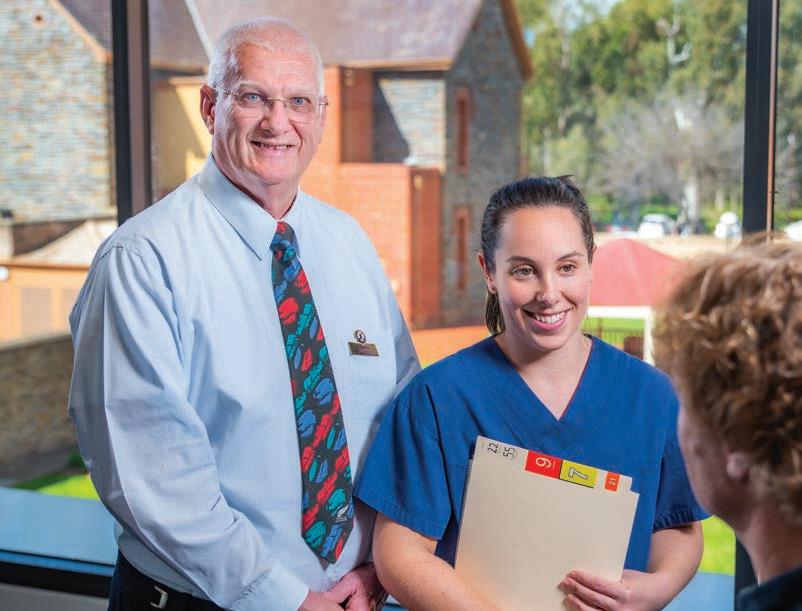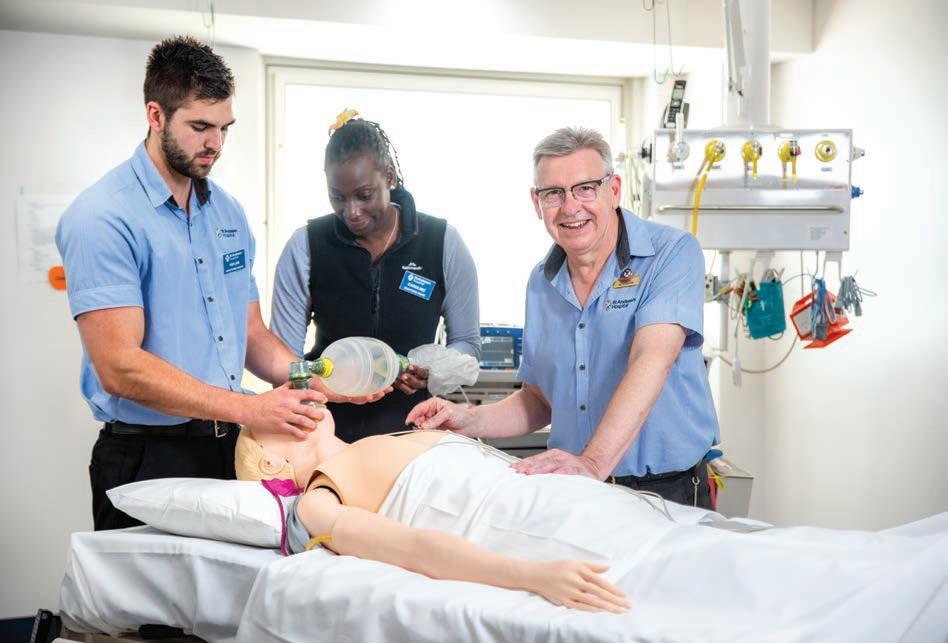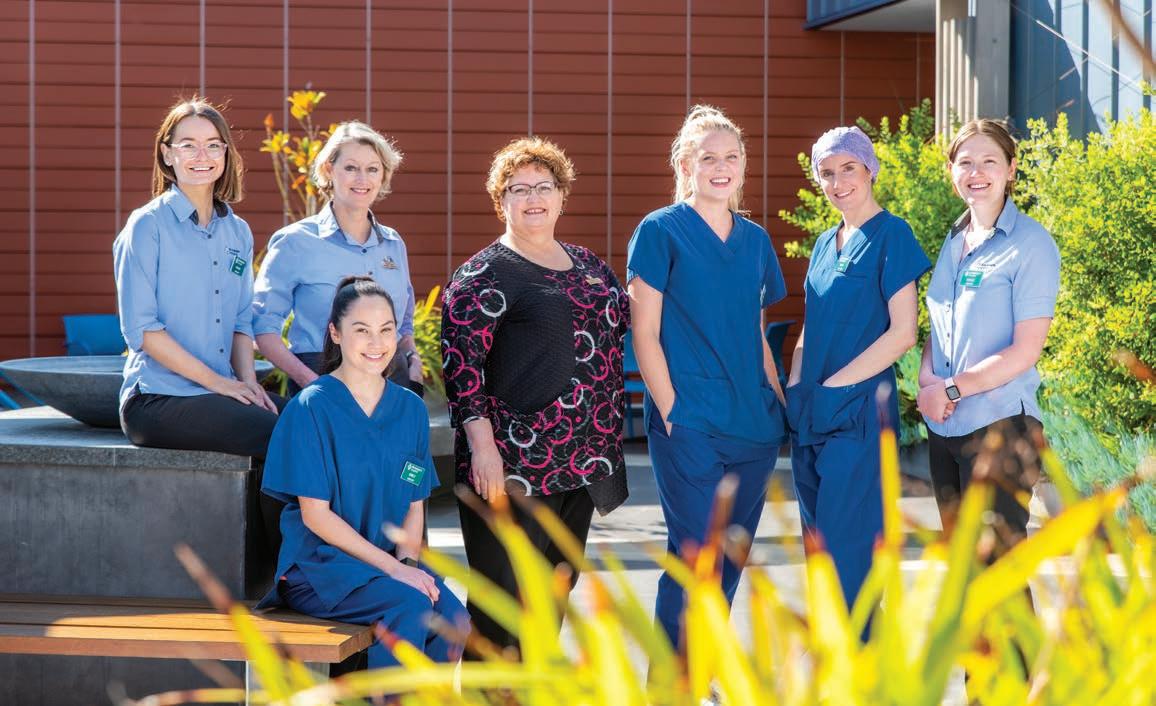
7 minute read
Nursing and Clinical Services
COVID-19 – Challenges and Successes
Although COVID continues to challenge us, it has enabled us to further embrace and accentuate the day-to-day practice of our values: We Care, We Create, We Deliver. COVID-19 has created an opportunity for us to reflect and confirm that these values define the culture in which we work every day. St Andrew’s has worked closely with SA Health, clinicians, patients and families to provide care in di cult situations such as end of life care, to provide as much support as possible while balancing the need to protect patients, family, St Andrew’s sta and key stakeholders. This requires flexibility and understanding of the driving principles of risk management and containment of an epidemic while maintaining a compassionate approach to real-life situations. It has resulted in a number of tailored solutions, such as planned and supported visitations; the use of technology to enable communication with those in restricted or remote locations; and the provision of clear information enabling patients and families to make informed decisions based on the best information available at the time. The continued provision of excellence in health care relies heavily on the care of our sta . A key focus during the hardest lock down periods and restrictions to elective surgery was to support sta . This was achieved through the provision of up-to-date information and education, planned leave, support for appropriate sta to work at home and the provision of programs and supports including mental health. New roles, practices and processes were put in place to help manage the rapidly changing environment in which we all found ourselves. St Andrew’s has always believed in the value of relationships, and that relationships matter. COVID has enabled us to demonstrate those relationships in practice and how they help to protect all of us during the pandemic. We would like to extend our thanks to our patients, families, sta and VMOs for working with us to keep everyone as safe as possible during this di cult time.
Clinical Education
Despite the di cult landscape, we are proud of our achievements in the education space.
Perioperative
The perioperative education plan has been developed over recent years to be a far more structured clinical program based on the skills required in the ever-changing perioperative environment. Perioperative graduate nurses complete their twelve-month contract in either scout or scrub nurse roles or in recovery/ anaesthetics, completing six months in each area. Competencies and workbooks are completed under the supervision and guidance of the perioperative educators, clinical nurses and mentors. This program continues to evolve and includes strong links to both the ACORN standards and the National Safety and Quality Healthcare Standards (NSQHS). Historically, di erent environments in the perioperative setting have experienced acute shortages of skilled sta , leading to low morale and poor workforce retention. This is not an issue unique to St Andrew’s, and was evident in the areas of anaesthetics and recovery in late 2017 and led to the appointment of two part time clinical educators in Recovery and Anaesthetics. Numerous existing sta , both graduates and lesser experienced, have been supported and educated through their professional journey to become highly valued and skilled in the area. In February 2021, a large group of new sta , including two graduates and others with varying levels of experience, commenced in the scrub/scout roles. This placed pressure on resources within the education team and the wider perioperative department. Subsequently, a business proposal was submitted to support the development of new sta through a structured mentoring and education program. This program continues today in all perioperative areas with the ongoing recruitment of new sta .
The need for further support has led to the appointment of a perioperative clinical nurse, with an education focus. This role has also allowed for a more robust auditing program linking back to NSQHS and ACORN standards, and has facilitated targeted education across all perioperative areas. The expanded education team has allowed for the collaboration of skills and sharing of ideas, facilitating a united focus on the continued improvement of education within the department. This program has been well received by both current and new sta members, and our surgeons continue to recognise the high calibre of nursing sta members in our procedural areas. The team delivering this program is to be commended for what they have delivered, ensuring the best care continues to be provided to St Andrew’s patients.
In October and November 2020, our executive and management team members attended Aboriginal and Torres Strait Islander Cultural Competence training in line with NSQHSS Standard 5. This session was provided by Ms Chris Thyer, on behalf of the Tauondi Aboriginal Community College. Chris’s extensive experience in providing this training was certainly evident in the sessions conducted. Her own indigenous experiences of growing up on a mission, her journey through mainstream education, employment, marriage and finally motherhood, demonstrate Aboriginal culture and the contemporary issues faced. The training revisited the history of colonisation, the tribes that inhabited Australia, the many cultural di erences and how they relate to the world. The plight of the First Nation people was shared as we journeyed through the history of mass killings, racism and lack of rights for indigenous peoples, who were classed as flora and fauna, and then through the impact of the Stolen Generation. The presenter managed this in a diplomatic and sensitive way, reinforcing that although history cannot be changed, it can provide us with an awareness that, as individuals and as an organisation, we can make a di erence as we move forward. Attendees’ feedback was overwhelmingly positive and, with this new understanding of indigenous culture, including the importance of family and the little importance of time and money, we will deliver care in a way that meets the needs of those patients who identify as Aboriginal or Torres Strait Islanders.
Advanced Life Support (ALS) Training
Historically, Advanced Life Support education has been provided to sta by one of our trainers in each specialty areas, leading to some variation in the delivery of the program. This strategy was challenged by team members three years ago. A working group, with representatives from Coronary Care, Angiography, CCU, Recovery and Anaesthetics and the Emergency Department met to design a comprehensive standardised program. Necessary changes were identified, and a scenario-based program was designed and delivered for accredited sta , and subsequently rolled out to all relevant areas. These sessions were designed to provide the annual updates sta require after attending an external Australian Resuscitation Council ALS1 course. The hospital now facilitates five to six ARC external courses each year at 321 South Terrace, with six participants attending each course. If sta attend an external course, they are not required to do a refresher session in the same year, ensuring consistency in approach. Restrictions related to COVID impacted on our ability to deliver these sessions. In the 2020/21 financial year, the program expanded to enable the delivery of a scenario-based ALS program utilising a new interactive manikin which enables those participating to increase their airway, cardiac rhythm, defibrillation and cannulation skills. The ergonomic design of the manikin means it can be transported to di erent clinical areas to ensure the scenario training and assessment is delivered in the clinical environment where the teams work. With the generous donation from the St Andrew’s Foundation, we now have a simulated learning program which allows feedback during scenarios and has the ability to perform practical invasive skills, a high calibre program carried out under higher fidelity conditions. This program adds another layer of expertise for our clinical teams, providing safe care to St Andrew’s patients.

Graduate Nurse Program - 2021

We received 473 applications for our highly regarded 2021 Graduate Nurse Program. 18 high-calibre applicants accepted positions at St Andrew’s to undertake their graduate year.
The 2020 (finishing) Graduate Nurse Program graduation ceremony was held on 21 January 2021. We continue to maintain a consistent rate of 98% of all graduate nurses over the last 10 years transitioning to permanency at St Andrew’s. This shows the rigor of the recruitment and induction program across the hospital.






